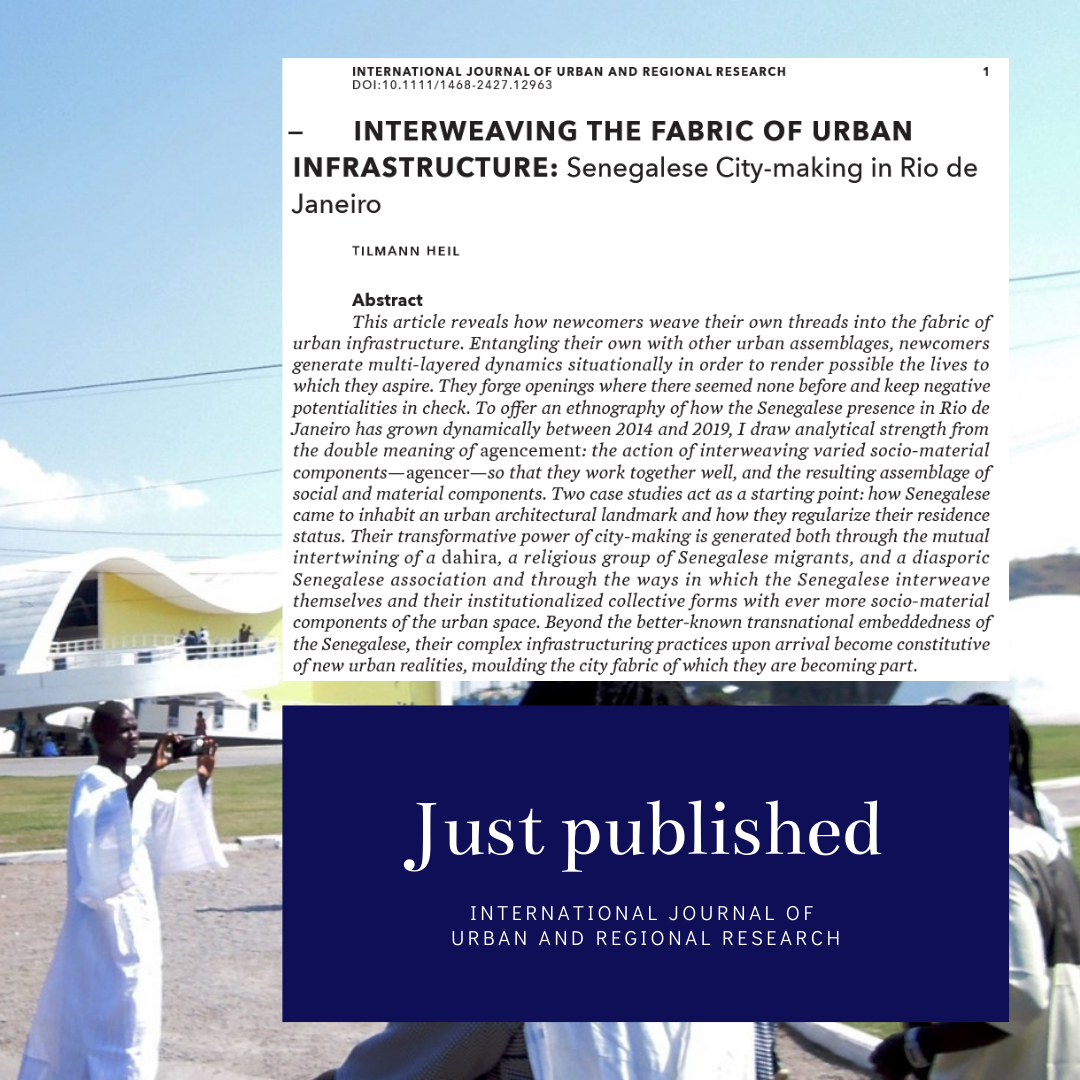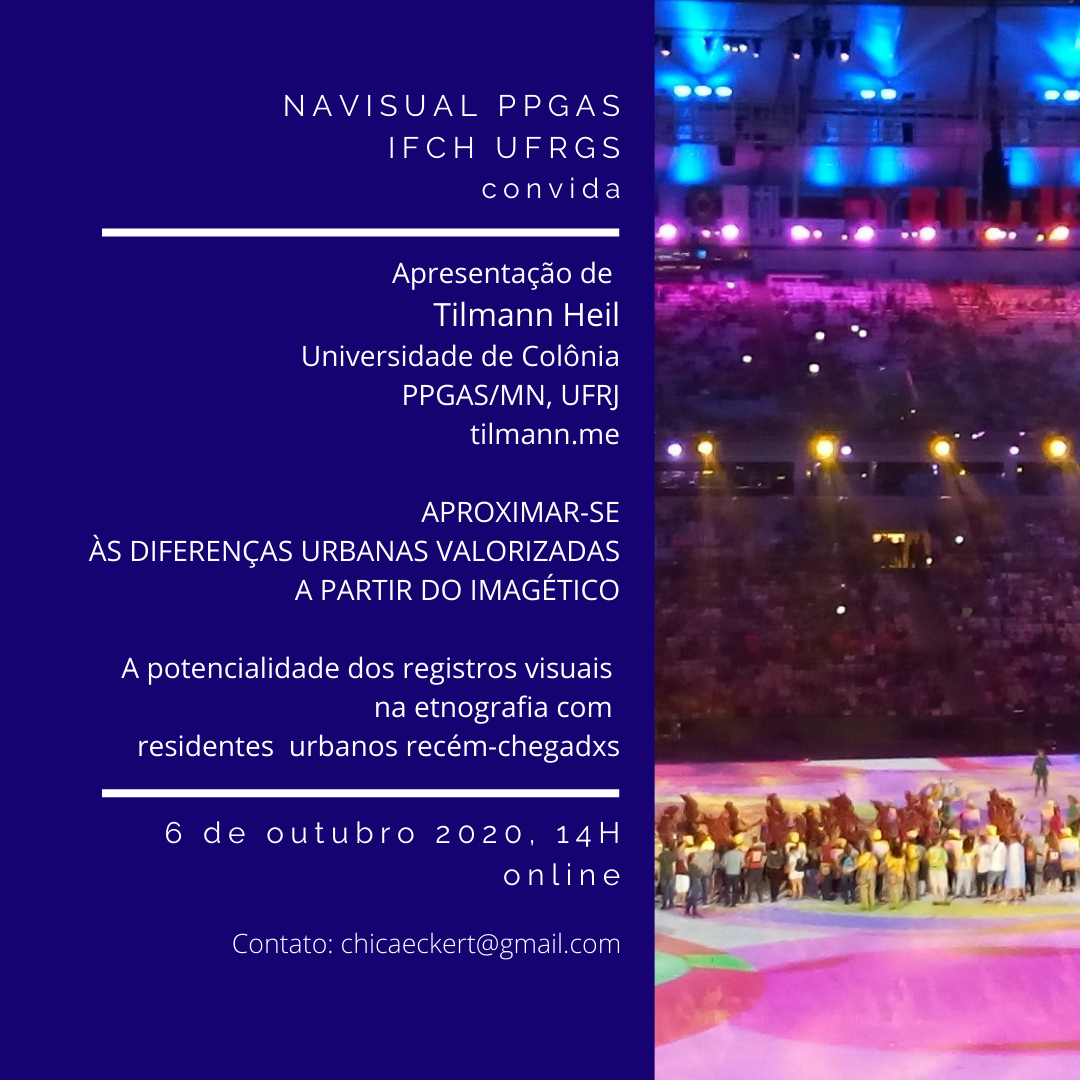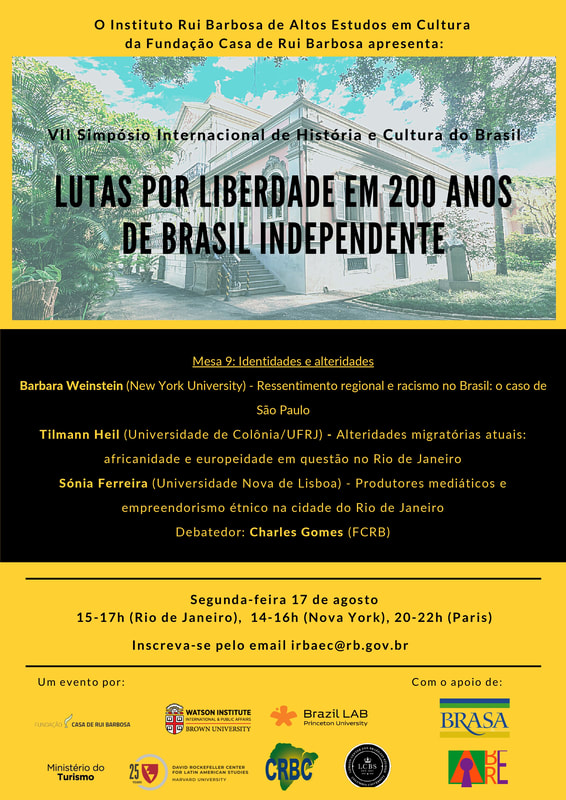|
It's a long journey that comes to an end as an #openaccess article in IJURR (doi.org/10.1111/1468-2427.12963).
I was fascinated how newcomers make the city according to their tastes, needs, visions, and projects weaving threads together that have not been connected before. I focus on the action of interweaving - or agencer - in which they connect themselves and their collective forms of organization to religious, social, political and material elements of urban space. First and foremost, I thank my interlocutors with whom I learned about the multiple Rios that emerge from complex lives lived in the multiple tensions in place. The article sheds light onto the process of arrival that is at the basis of my project Valued Difference that I have developed over the last years in Rio de Janeiro, on which you can read here. A potencialidade dos registros visuais na etnografia com residentes urbanxs recém-chegadxs Invited by the Núcleo de Antropologia Visual (NAVISUAL) of the Universidade Federal do Rio Grande do Sul I'll be presenting some of the visual cues that my interlocutors in Rio de Janeiro use to tell their stories in Rio de Janeiro and my own visual registers that developed over hearing their characterizations of the city and its inhabitants. I'm very much looking forward to the debate!
I will be presenting at the 9th roundtable on "Identities and Alterities" of this international symposium that honors the struggles for freedom in 200 years of an independent Brazil. I will discuss some of the current alterities in Brazli that arise from the recent arrival of West Africans and Southern Europeans in the city of Rio de Janeiro. I will discuss notions of Africanness and Europeanness in my interlocutors' narratives and experiences in Rio de Janeiro and how this discussion facilitates an understanding of some of the complexities of historically grown, currently active social hierarchies and racism in the city. Missed it? Please go and listen to our debate here!
The Centre is a collaboration between seven research institutions in four countries and two continents
in International Journal of Urban and Regional Research (IJURR)
Early View, pdf Abstract This article reveals how newcomers weave their own threads into the fabric of urban infrastructure. Entangling their own with other urban assemblages, newcomers generate multi‐layered dynamics situationally in order to render possible the lives to which they aspire. They forge openings where there seemed none before and keep negative potentialities in check. To offer an ethnography of how the Senegalese presence in Rio de Janeiro has grown dynamically between 2014 and 2019, I draw analytical strength from the double meaning of agencement: the action of interweaving varied socio‐material components--agencer--so that they work together well, and the resulting assemblage of social and material components. Two case studies act as a starting point: how Senegalese came to inhabit an urban architectural landmark and how they regularize their residence status. Their transformative power of city‐making is generated both through the mutual intertwining of a dahira, a religious group of Senegalese migrants, and a diasporic Senegalese association and through the ways in which the Senegalese interweave themselves and their institutionalized collective forms with ever more socio‐material components of the urban space. Beyond the better‐known transnational embeddedness of the Senegalese, their complex infrastructuring practices upon arrival become constitutive of new urban realities, moulding the city fabric of which they are becoming part. Post/colonial reconfigurations. The disregarded, renewed arrival of Spaniards in Rio de Janeiro7/4/2020
in International Journal of Immigration and Refugee Studies
accepted Abstract Given the renewed arrival of Spanish migrants in Brazil since 2008, I analyse how post/colonial power relations are re/configured and contradictions produced when legal and economic precarity question status hierarchies based on origin, race, and class. Brazil currently hosts the largest number of illegalised Spaniards worldwide. Illegality and precarity contest the favourable effects of nearly unconditional whiteness in Brazil and globally racialised, colonial power hierarchies. Derived from 2.5 years of ethnographic fieldwork in Rio de Janeiro since 2014, my interlocutors’ trajectories show how they struggle with and embrace the urban fabric and its structural post/colonial configuration. Keywords Brazil, postcolonial, whiteness, Europeanness, precarity, coloniality, status, hierarchy
Núcleo Interdisciplinar de Estudos Migratórios, IPPUR, Universidade Federal do Rio de Janeiro
During the second discussion of my monograph Comparing Conviviality during the first meeting of the Interdisciplinary Group on Migration Studies at the Federal University of Rio de Janeiro, I conveyed a long story in a nutshell: how my thinking on conviviality is grounded in representations and practices of neigbhourliness and cohabitation that make it necessary and possible to arrive at a concept of living with difference that frames forms of minimal sociality in unstable, uncertain, and changing urban contexts. This contrasts to Stuart Hall's characterisation of most of our concepts, which social sciences came up with to give us the impression of a stability that in actual fact never existed. Conviviality instead is meant to be a simple tool to speak of such complex and challenging situations and describe how human sociality unfolds in them.
I thank my colleagues from the Research Group and other participants for their interest and appreciation, especially Prof. Miriam da Silveira Santos who kicked off her comments with: 'I have accompanied Tilmann's work for some years now; no I finally understood what he does. He goes back to a key dimension of anthropology: that of comparison.' It resonated with Prof. Joana Bahia observation how I pay attention the fact that our interlocutors in the field - in my case transnational Senegalese from the Casamance region - are the true masters of comparison.
Três debates do meu livro em lançamento
I: Museu Nacional, Horto Botânico, Quinta da Boa Vista, s/n - São Cristóvão, Rio de Janeiro 12 de março 2020, 9:30 horas com os debatedores Joana Bahia, Professora titular, Universidade do Estado do Rio de Janeiro El Hadji Diallo, Jornalista e tradutor independente Charles P. Gomes, Pesquisador, Fundação Casa de Rui Barbosa II: Núcleo interdisciplinar de Estudos Migratórios, IPPUR, UFRJ, Rua da Lapa 120 / 204 13 de março 2020, 17:00 horas com a debatedora Miriam de Oliveira Santos, Universidade Federal Rural do Rio de Janeiro III. Centro de Estudos Africanos, Universidade de São Paulo, USP Sala 08, Avenida Luciano Gualberto 315 16 de março 2020, 15:00 horas com os debatedores Alexander Yao Cobbinah, USP Luciane Scarato, Universidade de Colônia e Mecila/Cebrap Sumário do livro Em um mundo onde a diferença é muitas vezes vista como uma ameaça ou desafio, o livro explora como as pessoas realmente vivem em sociedades diversas. Baseado numa etnografia a longo prazo de africanos ocidentais, tanto no Senegal como na Espanha, este livro propõe que a convivialidade é um compromisso com a diferença entre etnias, línguas, religiões e práticas. Tilmann Heil reúne histórias de longa data, projetos políticos e práticas cotidianas de viver com a diferença. Com foco na vida de bairros em Casamança, Senegal e Catalunha, Espanha - duas regiões igualmente complexas - o livro mostra como os senegaleses negociam e traduzem com habilidade os meandros da diferença e do poder. Nestes mundos africanos e europeus vividos, a convivialidade é sempre temporária e em transformação. Este livro oferece uma leitura texturizada, realista, porém esperançosa, da diferença, da mudança social, do poder e do respeito. in Mecila Working Paper 14 (full text)
Abstract Current academic usages of the notion of conviviality often carry a normative connotation in which it is opposed to tension and conflict. Instead, I propose to use conviviality as an analytical term; This everyday living together is characterized by tensions, contradictions, and inconsistencies that complicate abstract theorization and the use of clearly defined concepts whose role is, as Stuart Hall once suggested, to give us a good night’s rest by feigning a stability we long for. If conviviality is, as I suggest, understood as a notion that embraces the inconsistencies, multiplicities, and complexities of new urban ways, I inquire into the emerging relationalities between recently-arrived Senegalese and their social context in Rio de Janeiro under the impact of multiple hierarchical orders, including race, origin, education, and class. in Ethnography (full text)
Abstract For recently arrived West African migrants in the metropolitan area of Rio de Janeiro, the virtual and street encounters with travesti sex workers and queer beach goers provoked questions of relative power and status as experienced from a social margin of local Brazilian society. Based on ethnographic fieldwork since 2014, I address the question of how my Muslim interlocutors’ encounter with queers facilitate a particular and partial reading of Brazilian social relations, their legal mediation and their individual and social valuations. Moving between queer, postcolonial, queer of color and Muslim queer scholarship, I situate the local encounters of Muslim West Africans and queer subjects to differentiate and transcend the global framework of homonationalism and queer necropolitics. Situational positionalities result from the interplay of multiple geographical and social locations that, in their contradictions and interdependencies, are characteristic of contemporary urban configurations. Keywords inequality; hierarchy; margin; queer; homonationalism; Muslim; Brazil; West Africa; Murids; Rio de Janeiro Science and Culture in current-day BrazilI wake up to the news that the National Museum in Rio de Janeiro is burned down. One of the most important collections gone, one of the best libraries for Social and Cultural Anthropology gone, the archives of various former professors gone, the space where people researched, learned, discussed, tried to understand the former, present and future lives of people in Brazil and beyond gone, a historical monument marking key points of the Brazilian history gone, and most importantly one more place gone in which everybody could learn about the past and present of this country, become informed citizens, engage with the current devastating, worrying, sincerely frightening political, economic and social situation of Brazil - GONE. I came to Rio de Janeiro first hosted by the Universidade Estadual do Rio de Janeiro (UERJ) and then the National Museum of the Universidade Federal of Rio de Janeiro (UFRJ). Even the world heard in the past news on the castigation that the UERJ went through as the first place that offered evening classes for students who had to work and quotas to combat structural discrimination. But even one of the most elite places, which has become more democratic in recent years with a more diversified student and professorial body, had fallen into neglect over the past years having to stay closed at various points because of the lack of funding even for the most basic services, let alone a much needed reform. Now the flames had it. What can be recovered won't be much. It is a devastating and frightening coincidence - if you believe it is - that all of this happens at a time when there does not seem much interest in public education, or rather, where the interest much rather seems to be to keep the masses ignorant again to even better exploit them. This is how it feels in Brazil these days. Being far, I cannot follow the call of my colleague Maria Elvira Díaz Benítez to go there in the morning to rescue what is left, nor can I stand by my adviser Luiz Fernando Dias Duarte who has found very clear words identifying the root causes of this desaster (https://www.theguardian.com/…/fire-engulfs-brazil-national-…), nor join the efforts of the amazing stuff of the Biblioteca Francisca Keller - PPGAS, nor take to the streets with my fellows of the PPGAS. As I did when the Rectoria of the Federal University burned down a couple of years ago, where the library of the Interdisciplinary Nucleus of Migration Studies was housed and of which I am a member (NIEM), I can only be as supportive as possible from far. I hope that Institutions of Education worldwide will do the same in rebuilding a unreplaceable loss instead of accepting a void soon to be taken by the destructive forces of our time.
|





 RSS Feed
RSS Feed